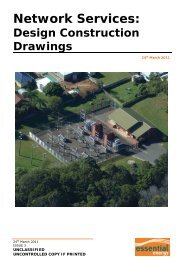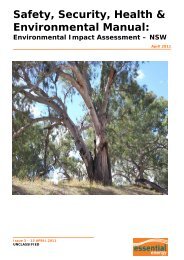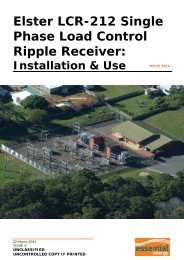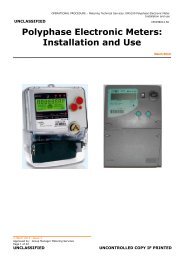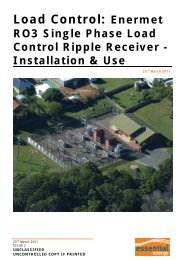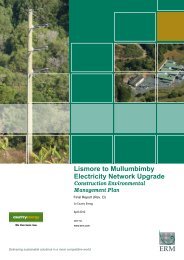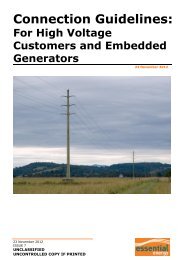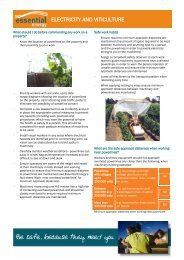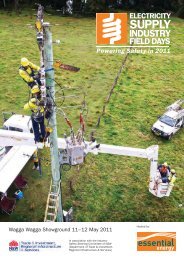Full Version - Essential Energy
Full Version - Essential Energy
Full Version - Essential Energy
Create successful ePaper yourself
Turn your PDF publications into a flip-book with our unique Google optimized e-Paper software.
24<br />
Multi-skilling<br />
Country <strong>Energy</strong>’s people have specialised skills and<br />
experience developed over 60 years in managing<br />
regional networks. Our field employees in particular<br />
are multi-skilled, which has proved a highly efficient<br />
and practical way of constructing and maintaining a<br />
geographically dispersed network.<br />
Multi-skilled employees often prevent the need to call<br />
on specialist teams who may be several hours away<br />
from a worksite. While our success can be partly<br />
attributed to our unique, decentralised structure, some<br />
highly specialised technical functions, such as zone<br />
substation and sub-transmission powerline design<br />
and construction, as well as overall asset maintenance<br />
strategies and policies are more centralised.<br />
This ensures state-of-the-art capabilities in areas<br />
where technological improvement is a constant.<br />
Price and equity<br />
In July 2004, we introduced a regulated retail price<br />
change for all electricity customers. In July 2004<br />
and May 2005, retail price changes were introduced<br />
for regulated gas customers in the Wagga, Wagga,<br />
Uranquinty Cooma, Bombala, Tumut and Gundagai<br />
regions. All changes were within specific limits set<br />
by the New South Wales pricing watchdog, the<br />
Independent Pricing and Regulatory Tribunal (IPART).<br />
These changes were the first under IPART<br />
determinations, effective from July 2004, which allowed<br />
for modest network price increases over five years and<br />
regulated retail electricity prices over three years.<br />
We also continued a program to introduce a uniform<br />
price list for all new connections. This is part of a longterm<br />
plan to consolidate ‘inherited’ prices, ensuring an<br />
equitable pricing structure for all.<br />
Security<br />
Significant work was undertaken this year to enhance<br />
our business continuity management capability,<br />
including the development of detailed business<br />
continuity plans to ensure the ongoing viability of<br />
critical processes. Our corporate crisis management<br />
and recovery program was also tested and refined in<br />
simulation, to ensure all employees involved in a crisis<br />
recovery are trained and prepared to respond.<br />
Our peak security group continued to develop and<br />
review security management plans for our most<br />
critical assets, including zone substations and major<br />
transmission and distribution powerlines, as well as<br />
overseeing progress towards certification against<br />
Australian Standard 7799 – Information Security<br />
Management.<br />
Improved information protection and security practices<br />
have been implemented to ensure security incidents,<br />
such as computer virus attacks and fraudulent access to<br />
systems, are contained to a minimal level. The team’s<br />
vigilance and advanced systems helped to respond<br />
successfully to a number of potentially significant<br />
attacks on our systems that affected other corporations<br />
worldwide, preventing downtime and information<br />
losses.<br />
A new security manual was added to our policy library,<br />
aimed at preventing security issues – from access to<br />
work sites and protecting valuables to armed robberies,<br />
threatening phone calls and suspicious mail packages.<br />
A guide is also being developed to help employees<br />
understand their personal rights and responsibilities.<br />
Both documents are part of an overall campaign to<br />
increase security awareness.<br />
Future goals – full certification of corporate data<br />
systems against Australian Standard 7799, ongoing<br />
review and refinement of business continuity planning<br />
response capability, and development of an improved<br />
emergency response framework.<br />
Taking the world stage<br />
Country <strong>Energy</strong> received international accolades when<br />
we were the only Australian company to win an award<br />
at the 2004 Utility Award – taking home the Utility<br />
Customer Relationship Management (CRM) Award for<br />
Australia and the Asia Pacific. The award related to<br />
our integrated Customer Information System (CIS)<br />
and CRM areas and specifically, the successful<br />
deployment of new CIS billing software known as<br />
<strong>Energy</strong>. The awards were contested by utilities from<br />
virtually every corner of the globe – from gas and water<br />
companies to municipal utilities and other energy<br />
companies.<br />
Our CIS is the backbone of our business and ongoing<br />
upgrades and enhancements are vital to our future<br />
success. <strong>Energy</strong> enables end-to-end customer<br />
management in one system, ensuring better levels<br />
of customer service.<br />
A second award was presented to our General Manager<br />
Information Services, Patrick Cooper, who was named<br />
Chief Information Officer (CIO) of the Year (for small to<br />
medium businesses) at the third annual IT & T Awards.<br />
He was one of three individuals recognised this year for<br />
being “a driving force for the adoption and execution of<br />
best-practice technology”.<br />
COUNTRY ENERGY ANNUAL REPORT 2004–2005



